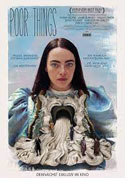

Opening 18 Jan 2024
Directed by:
Yorgos Lanthimos
Writing credits:
Tony McNamara, Alasdair Gray
Principal actors:
Emma Stone, Willem Dafoe, Ramy Youssef, Kathryn Hunter, Mark Ruffalo
It’s wicked. Expect to be outraged, appalled, shame-facedly fascinated, and ultimately amused by Poor Things, based on the 1992 novel by Alasdair Gray. Set in Victorian London, the unorthodox Dr. Godwin Baxter (Willem Dafoe) has the unfortunate appearance of Boris Karloff’s Frankenstein’s monster. Godwin’s father, another mad scientist, had performed excruciating experiments on his own young son Godwin; whether to further science or just torment him—it’s not clear. But the patchwork-faced anatomist Godwin, who occasionally belches bubbles, carries on his own experiments surpassing those of both his father and Dr. Frankenstein. He creates a pig merged with a chicken, a dog with a goose head, and oh yes, his own human creature Bella (Emma Stone), whom he loves like a daughter. She is not a monster but a lovely young lady, rather rough around the edges, and certainly not shackled to the social mores of polite Victorian society.
The moviegoer first encounters toddler-Bella embedded in a young lady’s body. She smashes plates just for fun, and screams uncontrollably when her “father”, who she calls God, leaves home to give lectures at the university. Luckily, he has employed the unruffled nanny aptly named Mrs. Prim (Vicki Pepperdine) to mother her. Yet Bella is rapidly maturing, her vocabulary is increasing daily, her movements less awkward, and she pokes scalpels into the eyes of her very own cadaver more precisely. Godwin hires one of his students, decent, shy Max McCandles (Ramy Youssef) to monitor her progress; this gentle soul has been obliquely handpicked to unabashedly fall in love with her. Before long, adolescent-Bella discovers the unadulterated pleasure of self-stimulation, leaving no nearby lying fruit or vegetable unscathed. “Bella discover happy when she want!” she exclaims unashamedly. Her physical awkwardness is diminishing, her vocabulary increasing, and her desire to go out into the world is unstoppable. Godwin and Max have to let her go when the sleezy cad Duncan Wedderburn (Mark Ruffalo) whisks her away to Lisbon so the couple can get on with the “furious jumping” they both so enjoy. But Duncan can’t curb her curiosity and insatiable lust for life. After spitting out food she doesn’t like while eating in polite company, she bristles when Duncan demands: “You will confine yourself to three phrases—'how marvelous,’ ‘delighted,’ and ‘how do they make the pastry so crisp’, yes? Well, no! Emancipated-Bella breaks from Duncan in Paris. Wantonly indifferent to Victorian social mores she gleefully discovers she can earn a living with the oldest profession in the world. Godwin and Max longingly pine for her return to the safety of their home. But that is yet another illusion. A twist of fate awaits in the person of the violent bully, Alfie Blessington (Christopher Abbott) who, unlike his name, is no blessing.
A dream-like vision Poor Things is a cross between Salvador Dali and (a somewhat deranged) Wes Anderson—very surreal, very stylized. Director Yorgos Lanthimos and cinematographer Robbie Ryan conjure a madly alternative world. Sometimes filming with a fisheye lens, other times using vintage camera equipment with specially constructed lenses, using both monochrome and 35mm Kodak Ektachrome film, they were able to capture the otherworldliness that the production designers Shona Heath and James Price had meticulously constructed. Godwin’s grotesque laboratory and opulent home which are so chock-a-block with authentic-looking and imagined Victorian delights, they at times resemble the pages in a children’s I Spy book. Keeping the tradition of the Golden Days of Hollywood, scenes were filmed on constructed sets using painted backdrops rather than relying on extensive CGI. Vintage yet futuristic London, Lisbon, Alexandria, and Paris seem somewhat familiar, but magically reimagined. The cruise ship which transports Bella away from Lisbon is a ten-foot miniature surrounded by modern LED panels creating exhilarating images of sea and sky. The first thirty minutes of the movie are black and white, perhaps to reflect Bella’s infantile perspective and/or to mimic monster movies of old. Once Bella breaks free from Godwin and Max the rest of the movie springs to life in vibrant colors, though not necessarily the colors we experience in our lives; the film’s color palette is hauntingly askew. Jerskin Fendrix’s magnificent score, often discordant and jarring, is perfectly interwoven into the soul of the film.
Costume designer Holly Waddington, who has had a lot of experience with period costumes, lets her imagination run wild dressing the cast and especially Bella. There is the toddler-Bella, barefooted, in smocks, ruffles, and puff sleeves. Adolescent-Bella adopts Victorian fashion again including puff sleeves and ruffles, but she sometimes forgets her skirt exposing underclothing resembling Bermuda shorts/mini-skirts. She also wears an undergarment, the Victorian bustle cage, but with nothing on top of it. Waddington dresses Paris-Bella in a pastel condom-styled cloak in Belle Époque Paris moments before her first meeting with the tattooed brothel madam (Kathryn Hunter) avoiding altogether the tacky black and red bordello attire. When aspiring-Bella dons an authentic Victorian black tailored jacket and black boots, she once again foregoes the skirt. Waddington designed Bella’s clothing with gloriously haphazard Victorian flair. Nothing quite matches, everything is a zany marvel, and every outfit she wears is outrageously fun. (An exhibition of Waddington’s costumes from Poor Things was held at the FIDM Museum in Los Angeles in December followed by an exhibition at the Barbican Centre in London ending in mid-January. Hopefully this will become a traveling exhibition coming to major cities worldwide to be enjoyed not only by Steamers [steampunk enthusiasts] but by the general public as well.)
Poor Things is a breathtaking film. All the actors are superb, making it almost impossible to choose a favorite. It’s not unusual to see moviegoers file out of the theater in silence, dazed after watching this epic two-hour-and twenty-one-minute film. Black humor has never been so lavishly seductive. (Pat Frickey)